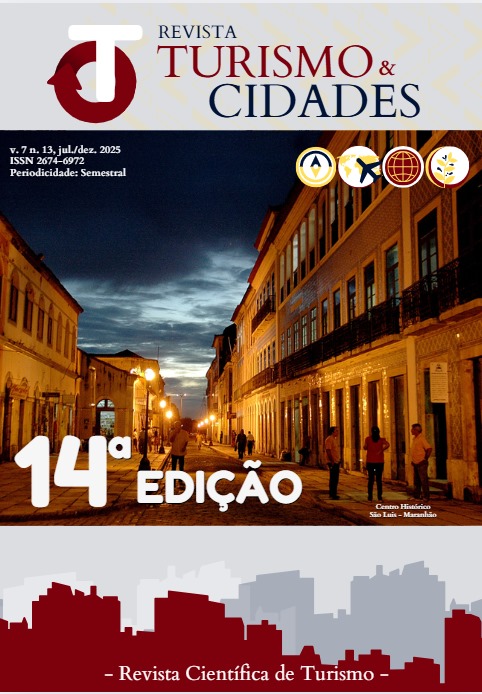Tourisme et Distance Psychologique : Une Revue Systématique
Mots-clés :
Distância psicológica, Comportamento turístico, Marketing, SustentabilidadeRésumé
La distance psychologique influence le comportement touristique, affectant l’attractivité et la décision de voyager. Les destinations lointaines peuvent sembler plus exotiques, mais elles créent également des barrières culturelles ou logistiques. Les stratégies de marketing, comme les images et récits de voyage, ainsi que les technologies (réalité virtuelle/augmentée), visent à réduire cette distance en créant des connexions émotionnelles. Cependant, ces approches peuvent simplifier les cultures locales et intensifier les impacts négatifs du tourisme de masse. Cette étude passe en revue systématiquement la littérature sur le sujet, en analysant comment la distance psychologique façonne les choix touristiques, quelles stratégies sont efficaces et leurs effets culturels et environnementaux. En suivant le protocole PRISMA 2020, la recherche propose des pistes pour équilibrer attractivité commerciale et durabilité.
Téléchargements
Références
DOW, Douglas. A note on psychological distance and export market selection. Journal of international marketing, v. 8, n. 1, p. 51-64, 2000.
FAN, Daisy XF et al. Towards a better tourist-host relationship: The role of social contact between tourists’ perceived cultural distance and travel attitude. Journal of Sustainable Tourism, v. 31, n. 2, p. 204-228, 2023.
FUCHS, Galia; EFRAT-TREISTER, Dorit; WESTPHAL, Monika. When, where, and with whom during crisis: The effect of risk perceptions and psychological distance on travel intentions. Tourism management, v. 100, p. 104809, 2024.
HATEFTABAR, Fahimeh. The impact of psychological distance on tourists’ length of stay: Survival analysis. Journal of Hospitality and Tourism Management, v. 46, p. 1-11, 2021.
JIA, Yanli; OUYANG, Jun; GUO, Qiang. When rich pictorial information backfires: The interactive effects of pictures and psychological distance on evaluations of tourism products. Tourism Management, v. 85, p. 104315, 2021.
KIM, Jungkeun et al. Application of construal-level theory to promotional strategies in the hotel industry. Journal of Travel Research, v. 55, n. 3, p. 340-352, 2016.
LE, Dung; SCOTT, Noel; WANG, Ying. Impact of prior knowledge and psychological distance on tourist imagination of a promoted tourism event. Journal of Hospitality and Tourism Management, v. 49, p. 101-111, 2021.
LE HONG, Vuong; HSU, Liwei. The effects of perceived cultural distance and perceived discrimination on the destination image and behaviour intention of international student tourists in Taiwan. Journal of Hospitality and Tourism Management, v. 58, p. 16-27, 2024.
LEE, Hyunae; YANG, Sung-Byung; CHUNG, Namho. Out of sight, out of cancellation: The impact of psychological distance on the cancellation behavior of tourists. Journal of Air Transport Management, v. 90, p. 101942, 2021.
LIU, Hongbo et al. Perceived cultural distance and international destination choice: The role of destination familiarity, geographic distance, and cultural motivation. Journal of Destination Marketing & Management, v. 9, p. 300-309, 2018.
MASSARA, Francesco; SEVERINO, Fabio. Psychological distance in the heritage experience. Annals of Tourism Research, v. 42, p. 108-129, 2013.
MOLINILLO, Sebastian; LIÉBANA-CABANILLAS, Francisco; ANAYA-SÁNCHEZ,
Rafael. Destination image on the DMO's platforms: official website and social media. Tourism & Management Studies, v. 13, n. 3, p. 5-14, 2017.
PALOMINO-TAMAYO, Walter; SAKSANIAN, Maria Christina; REGALADO-PEZÚA,
Otto. Psychological Distance in The Diaspora Marketing of Nostalgic Products: A Venezuelan Case. Revista de Administração de Empresas, v. 62, p. e2020-0418, 2021.
SCHULDT, Jonathon P.; RICKARD, Laura N.; YANG, Z. Janet. Does reduced psychological distance increase climate engagement? On the limits of localizing climate change. Journal of Environmental Psychology, v. 55, p. 147-153, 2018.
TAN, Wee-Kheng. From fantasy to reality: a study of pre-trip planning from the perspective of destination image attributes and temporal psychological distance. Service Business, v. 12, n. 1, p. 65-84, 2018.
TAN, Wee-Kheng; CHANG, Yun-Ghang. Electronic-word-of-mouth performance in different psychological distances and familiarity. Online Information Review, v. 39, n. 4, p. 449-465, 2015.
WU, Guanming et al. The Closer, the Better? Impact of Tourists’ Psychological Distance on Their Travel Intention in the Post-Pandemic Era. Journal of China Tourism Research, p. 1-24, 2023.
XU, Feng et al. Tourists’ on-site immersive experience for shortening psychological distance in the context of homologous and non-homologous cultures. Journal of Hospitality and Tourism Management, v. 58, p. 467-475, 2024.
ZHANG, Jun; SEO, Sangyun; LEE, Hoonyoung. The impact of psychological distance on Chinese customers when selecting an international healthcare service country. Tourism Management, v. 35, p. 32-40, 2013.
ZHOU, FangRu et al. Analysis of factors regarding the perceived distance of tourists. Journal of Zhejiang University (Science Edition), v. 43, n. 5, p. 616-624, 2016.
Téléchargements
Publié-e
Comment citer
Numéro
Rubrique
Licence

Cette œuvre est sous licence Creative Commons Attribution - Pas d'Utilisation Commerciale - Pas de Modification 4.0 International.

Esta obra está licenciada com uma Licença Creative Commons Atribuição-NãoComercial-SemDerivações 4.0 Internacional.
Autores mantém os direitos autorais e concedem à revista o direito de primeira publicação, sendo o trabalho simultaneamente licenciado sob a Creative Commons Attribution License o que permite o compartilhamento do trabalho com reconhecimento da autoria do trabalho e publicação inicial nesta revista.




